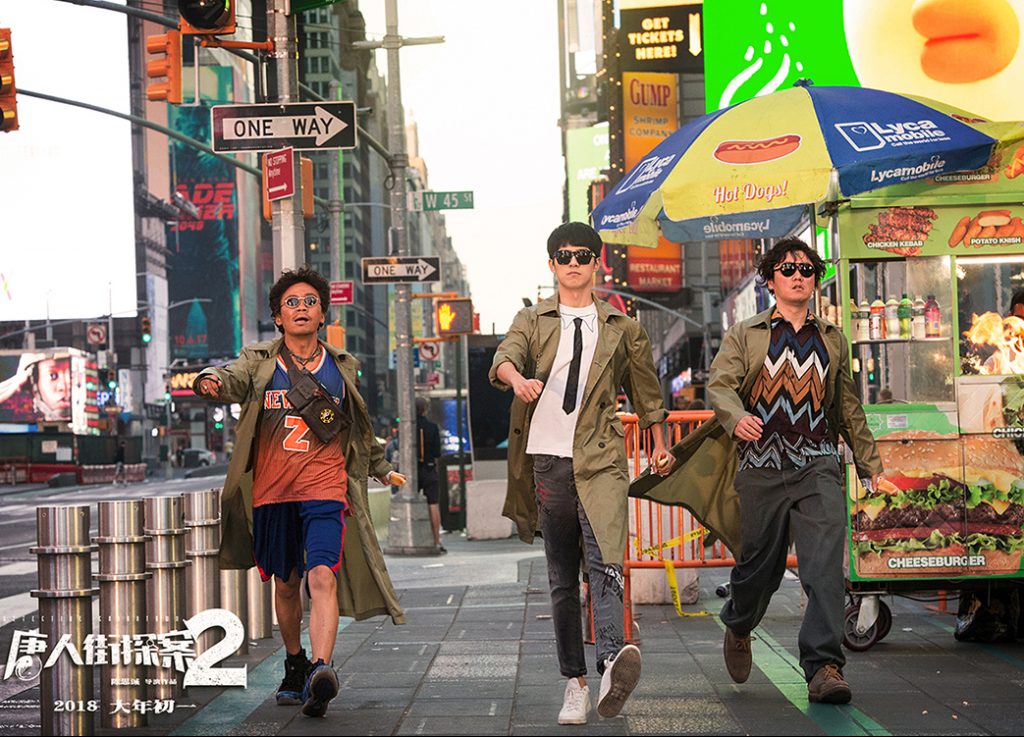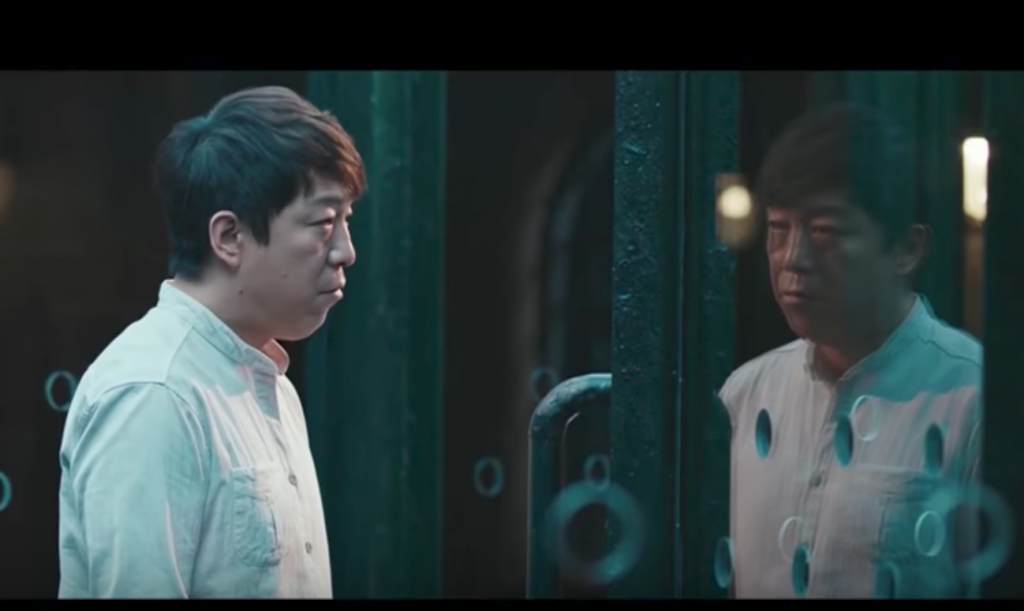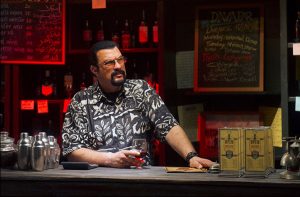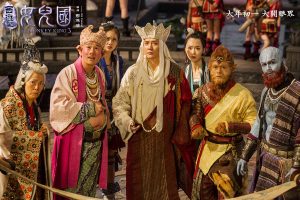Every day while CFI’s Hollywood readers take in the business of the Chinese film industry, the actual movies can sometimes seem exotic or remote. But in major US cities, mainstream Chinese films are increasingly available: thanks to Wanda’s purchase of AMC and distributors like China Lion, they get American theatrical releases practically simultaneous to their premieres at home. Though they receive virtually no publicity outside the non-Chinese community, these films are more than worth seeking out by anyone serious about engaging the Chinese industry, understanding the Chinese sensibility and familiarizing themselves with China’s talent pool. Periodically, CFI will review and point readers in the direction of noteworthy US releases of contemporary commercial and independent Chinese titles.
Shipwrecked on a desert island, workers face a series of crises that are largely their own doing in this Chinese dramedy.
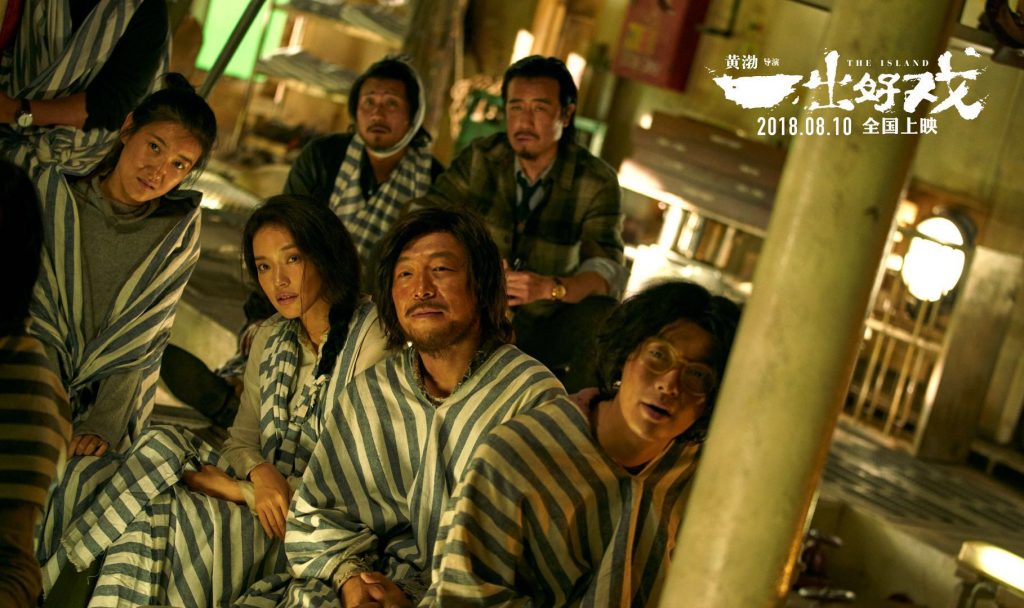
A still from ‘The Island’
Huang Bo not only stars in and directed The Island, he is one of several writers credited with the screenplay. Ambitious to a fault, this sprawling comedy-drama will please his fans while leaving others scratching their heads.
Bo plays Ma Jin, a sad-sack worker in a company run by boss Zhang (Yu Hewei). Along with his adopted brother, the goofy Xing (Zhang Yixing), Ma is forced into a team-building exercise that starts on an amphibious bus driven by guide Dicky Wang (Wang Baoqiang). Ma’s only consolation is that he will be near fellow employee Shan Shan (Shu Qi), a beauty who has so far studiously avoided him.
Ma scores some great deadpan gags in the opening scenes, then follows with a respectable special-effects montage of the end of the world. Seems a meteor has struck, causing a tsunami that flings Wang’s bus onto a desert island. Cut off from all communication, the twenty or so team members will have to figure out on their own a way to survive.
Wang, an Army veteran and former circus animal trainer, uses force to intimidate others into working for him. Ma and Xing drift away, Ma nursing a winning lottery ticket worth 60 million RNB that will expire in 90 days. Other workers split with Wang to side with Zhang, who has occupied the remaining half of an upended freighter that crashed on a distant beach.
Ma has to abandon his dreams of getting off the island in time to cash his lottery ticket. Instead, he and Xing use a sudden windfall to lure workers into a third camp apart from Wang and Zhang. At the same time, he starts to win over the formerly suspicious Shan.
Friendly dance parties around bonfires alternate with slapstick brawls as Bo and his writers add plot twists and reversals. Those who think they have an advantage find themselves outfoxed by rivals, while others nurse secrets that will affect everyone.
It’s hard not to read the plot as a political metaphor. First the worker masses are controlled by the equivalent of a warlord, then a capitalist. Ma’s third path seduces the masses into following a leader who may or may not be telling them the truth.
Huang Bo’s approach to his Lord of the Flies premise is a distinctly Chinese one tied to connecting social classes. (The Beach with Leonardo DiCaprio settled for routine violence; “Lost” for obscure, soap-opera narratives; and “Wrecked” for limp satire. And then Seth Rogen and Evan Goldberg went all apocalyptic for This Is the End.) Like real-life leaders, Wang, Zhang and Ma abuse their power and mistreat their workers, an idea that makes for good debates but not very compelling entertainment.
Bo’s secret weapon in The Island is Shu Qi, an effortlessly magnetic star who enlivens even the dullest material. Kept in the background for a lot of the story, she still brings a welcome human touch to a plot that keeps threatening to turn into a lecture. (There’s even a professor around to argue for spreading DNA, although he’s quickly shouted down by the women.)
The Island looks great, with outstanding locations, crisp cinematography and convincing special effects. Bo does better with the comic scenes than the dramatic ones, but on the whole this is polished mainstream work that could surprise American viewers. Still, the movie needed a few better twists to win over a broader audience.
– This article is originally appeared on Film Journal
WHAT DOES THE GRADE MEAN?
Here are some recent & modern-era vintage Chinese and Hong Kong films for comparison
- A+
- PLATFORM (2000, dir Jia Zhangke)
- THE WORLD (2004, dir. Jia Zhangke)
- DRUNKEN MASTER 2 (1994, dir. Lau Kar Leung & Jackie Chan)
- KUNG FU HUSTLE (2004, dir. Stephen Chow)
- A
- LET THE BULLETS FLY (2010, dir Jiang Wen)
- THE MERMAID (2016, dir. Stephen Chow)
- A TOUCH OF SIN (2013, dir. Jia Zhangke)
- STILL LIFE (2006, dir. Jia Zhangke)
- MOUNTAINS MAY DEPART (2015, dir. Jia Zhangke)
- LITTLE BIG SOLDIER (2010, dir. Ding Sheng)
- EXTRAORDINARY MISSION (2017, dir. Alan Mak & Anthony Pun)
- MR SIX (2015, dir. Guan Hu)
- A WORLD WITHOUT THIEVES (2004, dir. Feng Xiaogang)
- SUZHOU RIVER (1999, dir. Lou Ye)
- HOUSE OF FLYING DAGGERS (2004, dir Zhang Yimou)
- RAISE THE RED LANTERN (1991, dir. Zhang Yimou)
- A-
- DUCKWEED (2017, dir. Han Han)
- I BELONGED TO YOU (2016, dir. Zhang Yibai)
- B+
- THE GREAT WALL (2016, dir. Zhang Yimou)
- OLD STONE (2016, dir. Johnny Ma)
- CRAZY STONE (2006, dir. Ning Hao)
- GO, LALA GO (2010, dir. Xu Jinglei)
- B
- KUNG FU YOGA (2017, dir. Stanley Tong)
- RAILROAD TIGERS (2016, dir. Ding Sheng)
- THE WASTED TIMES (2016, dir. Cheng Er)
- CHONGQING HOT POT (2016, dir. Yang Qing)
- MONSTER HUNT (2015, dir. Raman Hui)
- B-
- JOURNEY TO THE WEST: THE DEMONS STRIKE BACK (2017, dir. Tsui Hark)
- SOME LIKE IT HOT (2017, dir. Song Xiaofei & Dong Xu)
- BORN IN CHINA (2016, dir. Lu Chuan)
- D-
- TINY TIMES (2013, dir. Guo Jingming)


